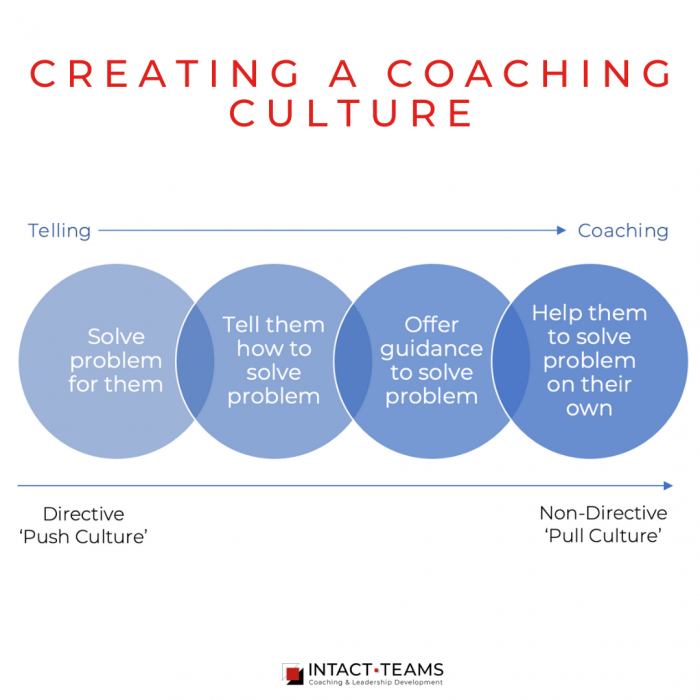Having all the answers is a manager’s sentiment of the past. In a world of rapid, disruptive change and multi-generational workplaces, command and control leadership is not viable anymore. Organisations are realising that they need to equip their leaders with coaching skills that help them develop and empower their teams.
That doesn’t mean every manager has to become an accredited executive coach. Organisational coaches are still hired externally as part of learning and development strategies. What it means is that organisations need to invest in training their people leaders on all levels to become more ‘coach-like’ so that they ask questions instead of providing all the answers, support their team members instead of judging them and facilitate their development instead of telling them what to do. It’s about making coaching integral to the fabric of a learning culture.
It’s a shift from a push to a pull culture:

Giving direction and the transfer of skill, of course, has its time and place, and it’s part of our job as leaders. When we hire new and inexperienced people, they need clear instructions and training. But as we develop our people and we know they have the skills or experience to solve a problem, create a strategy or develop a new idea, we need to ‘pull’ them in the right direction and use our coaching skills to enable learning and stretching rather than pushing and directing.
I was working with Annie, a leader in the health care sector. Although she was a young leader in her 20s, she had an amazing track record of having been promoted from graduate to project leader to team leader within 5 years. I was brought in to help her with her new role as she was new to leading people. She had a great relationship with her team, and they respected her for her expertise and drive, but Annie’s challenge was that she found herself constantly putting out fires, correcting mistakes and solving problems for her team. She said: ‘They are not quite on the level where I need them to be, and I find myself immersed in the projects rather than working on the long term strategy I was supposed to deliver to my boss. I just don’t have the time.’
I helped Annie reflect on her leadership style and what she spent most of her time and energy on, and it became clear that she was very directive, almost a command-and-control style. She wanted challenges to be solved fast, and because she knew how to, she solved most problems herself. A typical ‘push behaviour’ that holds team members back from solving problems themselves and the inability to learn for the future. Over the coming few weeks our sessions focussed on Annie adopting coaching skills to be able to empower and develop her people. I remember her excitement in one of our later sessions when she told me she had been able to deliver a big piece of work, a digital transformation strategy, to her executive team. Not only did she have the time and capacity to develop the project, but she had also involved some of her team members in creating it as they were working more independently now.
‘Leaders become great not because of their power but because of their ability to empower others. – John Maxwell
Here is a summary of WHY leaders need coaching skills:
- help develop others to achieve goals
- expand thinking and finding own solution
- empower and enable ownership
- support sustainable change to behaviour
- facilitate learning and development
- create belonging and motivate your team
There are many variants of coaching and, therefore, layers of skills, but the type of coaching most relevant to leaders in organisations are hierarchical coaching and team coaching.
Effective coaching skills for hierarchical coaching
Team leaders coach their direct reports or cross-departmental managers to
create a learning environment, care for and support their staff provide feedback and communicate and provide resources.
Effective coaching skills for team coaching
The leader facilitates a process and structure where members of the team agree on goals and targets and leverage their strengths. The skill of the team coach is delegation and empowerment.
When learning how to use a coaching approach, you realise that you already use many of the skills necessary, like being empathetic, being emotionally intelligent, and even listening skills. Being more coach-like means that you are aware of all different kinds of interventions and conversations and choosing the one that is most helpful for the other person in the context of the situation.
Mastering coaching skills is like having the best leadership toolbox ready to pull the levers you need to help realise the potential of your team members.
Here are the 8 Effective Coaching Skills that are a Must-Have for Leaders:
Recognition. Recognise individual achievements and celebrate success. Research by Deci & Ryan (self-determination theory) shows that positive feedback motivates intentions to continue pursuing goals.
Collaborate. Work with your team members and include them in decision making, goal setting and strategy development. This will make them feel empowered and connected to a higher purpose. A real move from command & control to inspiring leadership style.
Feedback culture. Ask team members to reflect and learn from mistakes. Great feedback, especially when mistakes happen, helps to build trust. It creates psychological safety, which means people feel safe to admit mistakes or ask for help. One of the most powerful ways to enable learning.
Strengths. Help your team members to identify their strengths for exponential growth. Make their weaknesses irrelevant. For your team: find where someone’s shoulders are the broadest and offer up what strengthens them, and ultimately the team, the most. Solve problems and innovate by using everyone’s strengths.
Emotional Intelligence. Increase self-awareness and manage emotions when interacting with your team members, especially when under pressure. Showing up with authenticity, being aware of others and inspiring leadership is all part of a coaching approach.
Care personally. Understand the whole human being part of a system. Support your team member’s wellbeing and life outside work. People who feel understood and cared for, engage more.
Empathy. Put yourself in someone else’s shoes, understand their situation and give them tools to overcome challenges.
Communication and active listening. Listen not only to what is said but how it is said (emotions and energy) and what is not said (level 3 listening). Be present, maintain eye contact and focus entirely on the other person. Reflect (use their words), ask open questions to expand the thinking for the other person (not to understand the context for yourself). Request permission to give feedback or advice.
‘Leadership is not about being in charge. Leadership is about taking care of those in your charge.’ – Simon Sinek
Creating a coaching culture means equipping your people with the necessary skills to stop pushing and to start pulling. Contact me on jessica@intactteams.com to talk about our Leadership Program ‘Creating a Coaching Culture’.








